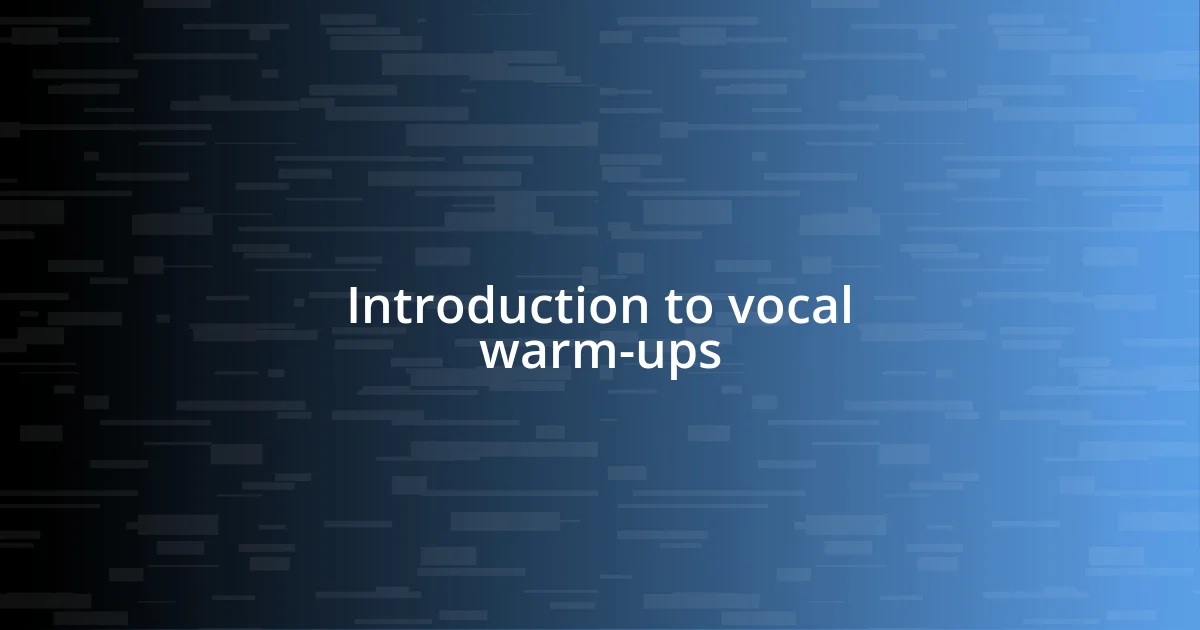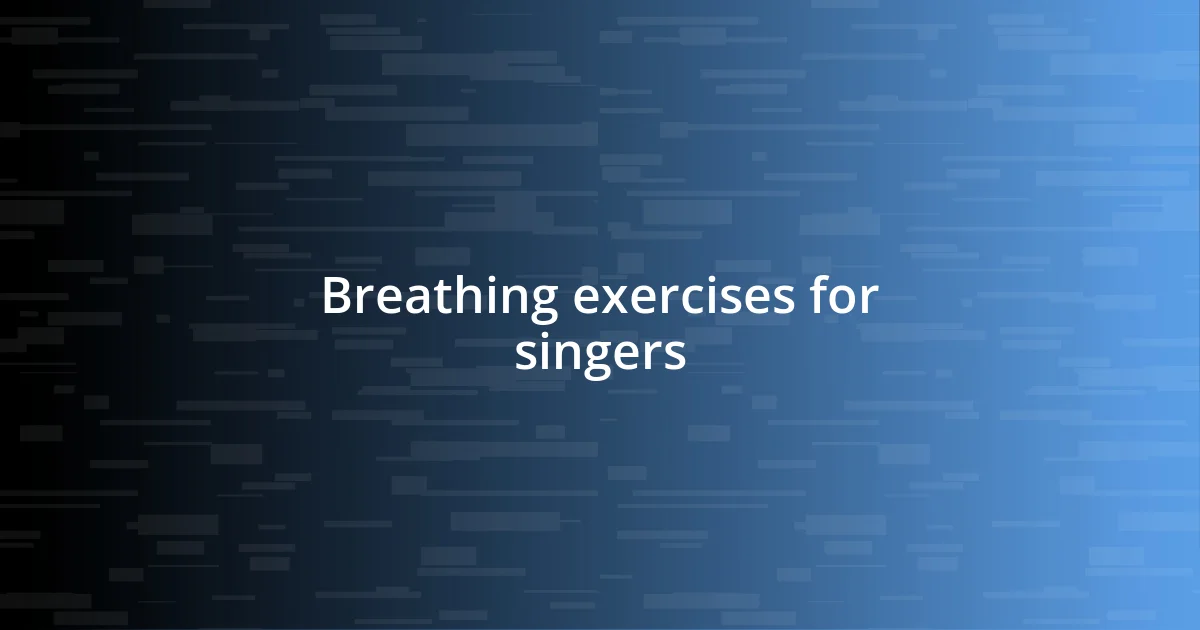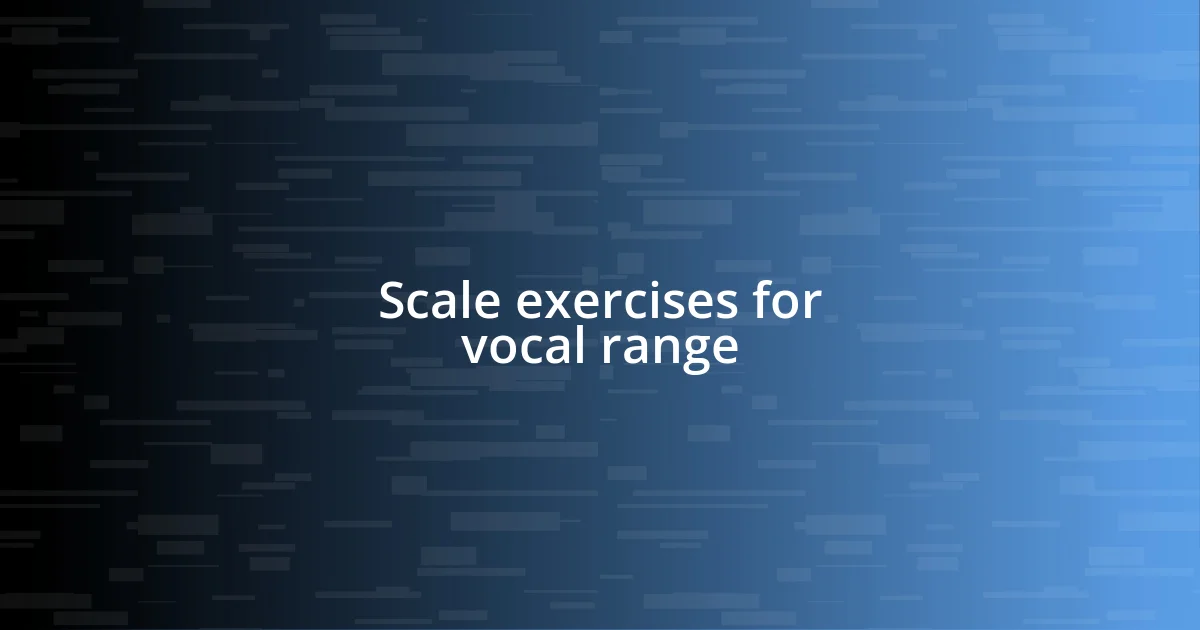Key takeaways:
- Vocal warm-ups are essential for enhancing vocal quality, preventing strain, and boosting confidence during performances.
- Incorporating various techniques, such as breathing exercises, lip trills, sirens, and scale exercises, can significantly improve vocal control, range, and agility.
- Consistency and a playful, experimental approach to warm-ups can lead to personal breakthroughs and a deeper connection with one’s voice.

Introduction to vocal warm-ups
Vocal warm-ups are essential for anyone looking to enhance their singing or speaking voice. I remember the first time I neglected to warm up before a performance; my voice felt tight and uncooperative, a stark reminder of just how vital these exercises can be. Do you ever feel your voice lacks vibrancy when you skip your routine? That’s because warming up not only prepares your vocal cords but also sets the stage for greater vocal flexibility and strength.
As I’ve learned through years of experience, vocal warm-ups help prevent strain and injury, turning a potential disaster into a smooth performance. I still think back to those early days when I would enthusiastically dive into singing without stretching my voice. The regret I felt was palpable after struggling to hit the notes. Isn’t it amazing how a few minutes of warm-up can make a world of difference in confidence and sound quality?
Not all warm-up techniques are created equal, and finding the right ones for you is a journey worth taking. In my practice, I’ve discovered techniques that resonate deeply, transforming not just my voice but also my approach to singing itself. Have you ever tried a method that seemed simple yet unlocked something extraordinary in your performance? That’s the magic of a good warm-up; it’s about exploring and connecting with your voice on a deeper level.

Importance of vocal warm-ups
Vocal warm-ups are vital for maintaining a healthy voice. I remember a gig where I felt invincible and skipped my usual routine. It was a humbling experience when my voice cracked mid-song, reminding me that skipping warm-ups can lead to unintended consequences. How many times have you found your voice betraying you when you didn’t take those few minutes to prepare?
In my experience, these exercises significantly enhance vocal control and endurance. I often reflect on how warm-ups transformed my singing from a shaky effort into something dynamic and resonant. It’s fascinating to see how shaping your vocal cords through warm-ups can change not just your sound but also your entire performance presence. Have you ever noticed the increased ease in your voice after a proper warm-up? It’s almost like discovering a hidden layer of your talent.
Moreover, incorporating warm-ups into your routine fosters a deeper connection with your instrument. I often find myself exploring new techniques that not only prepare my voice but also spark creativity in my performances. The journey of finding what works best for me has truly been enlightening. Can warming up be more than just a physical exercise? Absolutely—it becomes a ritual that nurtures self-expression.
| Benefit | Description |
|---|---|
| Prevention of Injury | Warm-ups help protect vocal cords from strain and potential damage. |
| Vocal Flexibility | They enhance agility in pitch and range, allowing for more dynamic singing. |
| Increased Confidence | A proper warm-up boosts your self-assurance and performance anxiety. |

Breathing exercises for singers
Breathing exercises are foundational for singers, as they directly impact vocal control and stamina. I remember a time when I struggled to sustain a long note during a performance. It was embarrassing, and I realized that it was my breath support, or lack thereof, that let me down. Now, I prioritize breath control exercises daily; they not only strengthen my diaphragm but also enhance my overall tonal quality.
Here are some effective breathing exercises for singers:
- Diaphragmatic Breathing: Place your hand on your stomach and inhale deeply through your nose, ensuring your stomach rises. This helps engage your diaphragm fully.
- Sustained Hisses: Take a deep breath and, on your exhale, create a steady “hiss” sound. Aim to prolong the sound, which builds breath control.
- Counting on Exhales: Inhale deeply and exhale while counting, trying to increase the numbers with each session. This helps improve breath capacity.
- Breath-Focused Yoga: Incorporating yoga poses that emphasize long, controlled breaths can enhance lung capacity and relaxation.
Integrating these practices into your routine has made all the difference for me. I often reflect on those moments of panic when I worried about running out of breath mid-phrase. Now, with each deep breath, I feel more connected to my voice, like every note I sing is supported by a secure foundation. It’s incredible how refining something so basic can elevate not just your singing but your entire performance experience.

Lip trills and their benefits
Lip trills are a fantastic vocal warm-up technique, and I can’t emphasize that enough from my own experience. Picture this: I was nervous before an important audition, and I decided to incorporate lip trills into my routine. The moment I felt those vibrations resonate through my lips, it’s like a sense of calm washed over me. Have you ever felt that immediate connection to your voice? It’s invigorating!
What makes lip trills so beneficial is their ability to relax the vocal cords while still engaging them. I once struggled with tension in my throat during high notes, and incorporating lip trills transformed that struggle into ease. They create a smooth airflow, allowing your sound to flow naturally rather than forcing it out. Isn’t it amazing how something so simple can lead to a significant improvement in vocal clarity and agility?
Additionally, lip trills serve as a fantastic tool for expanding your vocal range without strain. I vividly recall a time when I was attempting to hit those high notes for a challenging piece—I was hesitant, but after some dedicated trilling, I discovered a newfound freedom in my voice. It was like unlocking a door to a space I didn’t even know existed. Have you tried lip trills in your warm-up? They might just surprise you with their immense benefits!

Sirens to stretch the voice
One of my favorite vocal warm-up techniques is using sirens. When I first started incorporating them into my practice, I was amazed at how quickly they helped stretch my voice. Picture this: you glide up and down your range like a siren calling from the sea, and each note feels like it’s opening up pathways. Have you ever experienced that exhilarating freedom in your voice? It’s quite liberating!
Sirens are fantastic for gently accessing both the upper and lower ranges, which really helps to eliminate any tension throughout the vocal cords. I remember during one rehearsal, I felt tightness whenever I tried to reach for higher notes. When I switched to sirens, that tension melted away. Instead of straining, I began to flow through my notes effortlessly. It’s incredible how this simple technique can shift your entire approach to singing.
Moreover, using sirens not only stretches the voice but also trains your ear to hear and understand pitch better. During one session, I focused on making my sirens as smooth as possible without any breaks. I found that doing so really improved my pitch accuracy in my performances. It’s a game-changer—have you tried using sirens in your warm-up? They might just be the key to unlocking new vocal dimensions for you!

Scale exercises for vocal range
Scale exercises have always been a crucial part of my warming-up routine. I remember the first time I really focused on them; I decided to tackle a challenging piece and realized how much my vocal range expanded with consistent practice. There’s something about sliding up and down the scales that brings a clarity to my voice. Have you ever noticed how these exercises help you find notes you didn’t even know you could reach?
When working through scale exercises, I found that starting from the middle of my range and ascending or descending allows me to slowly build strength and confidence. I recall a performance where I struggled with higher pitches, but after incorporating this technique into my warm-up, those notes came out effortlessly. The satisfaction of hitting those scales accurately gives such a boost to your overall prowess. It’s surprising how something so simple can lead to such powerful results!
Another key benefit of scale exercises lies in their ability to increase vocal agility. As I practiced various patterns, I started to feel more comfortable navigating tricky melodic lines. I distinctly remember being challenged by rapid phrases in a song; however, spending just a few minutes on focused scale runs made all the difference. It’s like having the tools to tackle any vocal challenge thrown your way. Have you tried integrating targeted scale exercises into your warm-up? You might just discover your voice expanding in ways you never imagined!

Conclusion and practice tips
As I reflect on my journey with vocal warm-ups, it’s evident how critical these techniques are for enhancing vocal performance. Remember, consistency is key. I’ve learned that dedicating just a few minutes each day to warm-ups like sirens and scales can create a world of difference. How often do you find yourself skipping your routine? I used to do that, but embracing regular practice not only boosted my range but also made each performance feel more comfortable and enjoyable.
When practicing, I recommend focusing on your breath support. I can’t stress enough how it transformed my singing. Pairing breath exercises with my vocal warm-ups brought a new level of control I never thought possible. Have you ever taken a moment to simply breathe before launching into your scales? It makes your voice feel grounded and fully engaged.
Lastly, be sure to approach your warm-ups with an open mind and a playful spirit. I often remind myself to treat my voice as an instrument—one that requires experimentation and care. Try exploring different styles or techniques during your practice. What surprises await you in your vocal journey? Don’t shy away from discovering what resonates with you, as every new approach could unveil a vocal breakthrough that feels incredibly rewarding.












